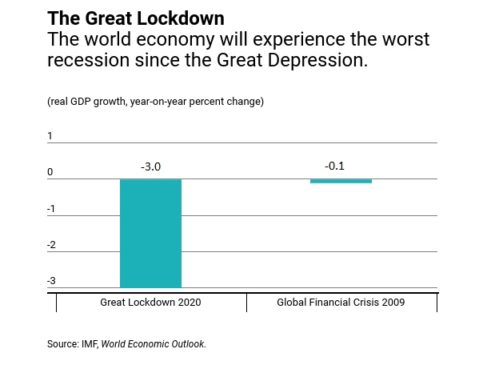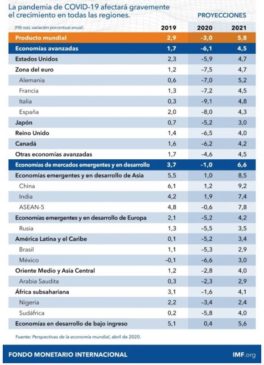[ad_1]
The International Monetary Fund IMF already has a name for this economic recession: “The Great Confinement”. Here is an analysis.
***.
In his blog on economic issues, the IMF today published an article signed by expert Gita Gopinath (*) explaining that we are in the worst economic recession since Great Depression, 1929 the biggest financial crisis of the last century.
In the following we publish important extracts of what the article “The Great Confinement” (or “Great Enclosure”) expresses, which you can read in full here.
IMF: The great detention
The article begins with the remark that the world has changed in the past three months: “An unusual catastrophe, a coronavirus pandemic, has caused the loss of a tragically high number of lives. When countries introduced the necessary quarantines and social detachment practices to contain the pandemic, the world went into great detention. We have never seen the extent and speed of activity interruption in our lives. “
He adds that it is a crisis like no other and that there is great uncertainty: “Much depends on the epidemiology of the virus, the effectiveness of containment measures, and the development of therapies and vaccines, all of which are difficult to predict.”
It indicates that “assuming that the pandemic and containment requirements peaked for most countries around the world in the second quarter and will decline in the April second half of the world economic outlook, We expect global growth to decrease to -3 percent in 2020. This is a decrease of 6.3 percentage points compared to January 2020, a comprehensive revision in a very short time. This makes the detention the worst recession since the Great Depression and much worse than the global financial crisis. “

Further IMF projections on large detention
The IMF makes further projections in writing: “Assuming that the pandemic subsides in the second half of 2020 and that policies are effective around the world to prevent widespread corporate bankruptcies, sustained job losses, and financial tensions across the system, pWe expect global growth to recover to 5.8 percent in 2021. “
It also says: “This recovery in 2021 is only partial as the level of economic activity is expected to remain below the level we had forecast for 2021 before the virus arrived. The cumulative loss of global GDP in 2020 and 2021 due to the pandemic crisis could be around $ 9 trillion, more than the economies of Japan and Germany combined. “
All in recession, rich and poor countries
Emphasize that It is a global crisis and no country is spared. Even fewer those who make a living from tourism or entertainment. It says that too “Emerging and developing countries face additional challenges with unprecedented reversals in capital flows as appetite for global risk and monetary pressures ease as they face weaker health systems and more tax space limited to support“”
It is stressed that for the first time since the Great Depression, both advanced and emerging and developing economies are in recession. “This year, growth in advanced economies is forecast to be 6.1 percent. Emerging and developing countries with normal growth levels that are well above the advanced economies are also likely to have negative growth rates of -1.0 percent in 2020 and -2.2 percent if China is excluded. A decline in per capita income is forecast in more than 170 countries. Both the developed and emerging and developing countries are expected to partially recover in 2021. “
Other adverse IMF scenarios
He emphasizes that they are considering even less favorable scenarios given the uncertainty.
The pandemic may not reverse in the second half of the year, leading to a longer containment period, a deteriorating financial situation and the collapse of global supply chains. In such cases, global GDP would continue to decline: another 3 percent in 2020 if the pandemic lasts longer this year, and if the pandemic continues in 2021, it could decrease another 8 percent next year compared to next year . with our reference scenario.
Political measures
It is also stressed that the decision to save lives or sustain livelihoods is wrong. “The countries They still have to provide plenty of money for their health systemsCarrying out widespread screening tests and refraining from trading restrictions on medical care. There must be a global effort to ensure that both rich and poor countries have immediate access to therapies and vaccines to be developed. “
It also believes that while the economy is paralyzed, “”The authorities need to ensure that people can meet their needs and that companies can reactivate once the acute phases of the pandemic are over. “ Indicates that support must continue during the containment phase “To minimize the persistent scars that could cause the investment decline and job losses during this severe slowdown.”
It also indicates that authorities should develop recovery plans. And he adds that multilateral cooperation is vital to the health of the global recovery.
Loans from IMF
The International Monetary Fund has been reported to use its $ 1 trillion credit capacity to support vulnerable countries. “Among other things, we call on official bilateral creditors to do the same through emergency financing with rapid disbursements and debt relief for the poorest member countries.”
Finally, he points out that there are hopeful signs that this health crisis will end. “Countries are managing to curb the virus at least for the time being through distancing practices, screening, and contact tracking, and treatments and vaccines may develop earlier than expected.”

(*) The author Gita Gopinath is an economic consultant and director of the study department of the International Monetary Fund (IMF).
Source: IMF
Summary of DailyBitcoin
Youtube picture
[ad_2]

Add Comment